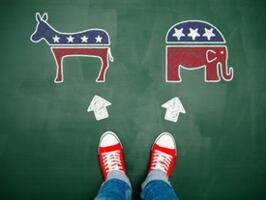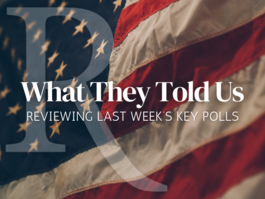Voters Question Government’s Focus on Domestic Terrorism
Voters continue to feel the federal government is not devoting enough attention to the terrorist threat of radical Islam here at home.

Voters continue to feel the federal government is not devoting enough attention to the terrorist threat of radical Islam here at home.

North Korea is called the "worst place on earth" for good reason. Thousands of people are tortured. Some North Koreans eat rodents to try to survive, and many starve anyway. In winter, they freeze. No one but the dictator has any true freedom, and no one is allowed to leave.

Like the bumper sticker says, a gun’s only serious enemies are rust and politicians. At least rust has principles.

Voters still insist they value substance over more superficial factors when deciding whom to vote for, but they are a bit more likely to admit their emotions play a role.

One of the many painful signs of the mindlessness of our times was a recent section of the Wall Street Journal, built around the theme "What's Holding Women Back in the Workplace?"
Whenever some group is not equally represented in some institution or activity, the automatic response in some quarters is to assume that someone has prevented equality of outcomes.

Voter attitudes about Planned Parenthood have not changed in the nearly three months since the release of the first secretly-taken video showing representatives of the group discussing the sales value of body parts of aborted babies. But for a sizable majority, it’s an issue they’ll remember come election time.

Not all important public policy reforms come from Washington. Really lasting reforms can percolate from the bottom up, brewed by citizens with a grievance pushing state and local governments to act.

Most U.S. voters still consider the United States the best country in the world, but they don’t think we are winning any popularity contests.

Twenty-six percent (26%) of Likely U.S. Voters now think the country is heading in the right direction, according to a new Rasmussen Reports national telephone survey for the week ending October 1.

U.S. voters want to put the breaks on the Obama administration’s plans to bring tens of thousands more refugees into this country over the next two years, many from the Middle East, and strongly believe Congress should have a say in the matter.

Following a disappointing government jobs report for September, most voters continue to express frustration over the economy.

There’ve been some big surprises here and abroad in recent days, with John Boehner resigning as speaker of the House and Russia pitching in to defeat the radical Islamic group ISIS in Syria.

If you doubt that the politics of identity have triumphed over the debate over ideas, read the New York Times story about how "Carly Fiorina Both Repels and Enthralls Liberal Feminists."

Donald Trump added some substance to his campaign this week with the release of a major tax cut plan and has reversed his declining fortunes in Rasmussen Reports’ latest Trump Change survey.

"I'd say a lot of people want liver."
The propagandists of Planned Parenthood don't want you to remember that earlier this summer the group apologized for the "tone" of one of its top officials, Deborah Nucatola, who casually hawked unborn baby parts to undercover journalists from the Center for Medical Progress as she swilled wine and chomped on a salad.

Sherlock Holmes famously solved the mystery of the Silver Blaze by noting the dog that didn't bark in the night. It strikes me that in this wild and woolly campaign cycle there have been numerous dogs not barking in the night, or in the daytime either.

Vice President Joe Biden is keeping everyone guessing about whether he will run for president in 2016, but how would he fare against his party’s frontrunner, Hillary Clinton?

Turing Pharmaceuticals CEO Martin Shkreli made headlines last week when he purchased the rights to a drug used to fight AIDS complications and increased the price by 5000% overnight. Shkreli later promised to lower the price under pressure from medical groups and politicians, but the incident highlighted the continuing problem of rising prescription drug costs.

When tracking President Obama’s job approval on a daily basis, people sometimes get so caught up in the day-to-day fluctuations that they miss the bigger picture. To look at the longer-term trends, Rasmussen Reports compiles the numbers on a full-month basis, and the results can be seen in the graphics below.

Democrats are all for letting Joe Biden participate in their first presidential candidate debate and are pretty convinced that it’s only a matter of time before he enters the race.